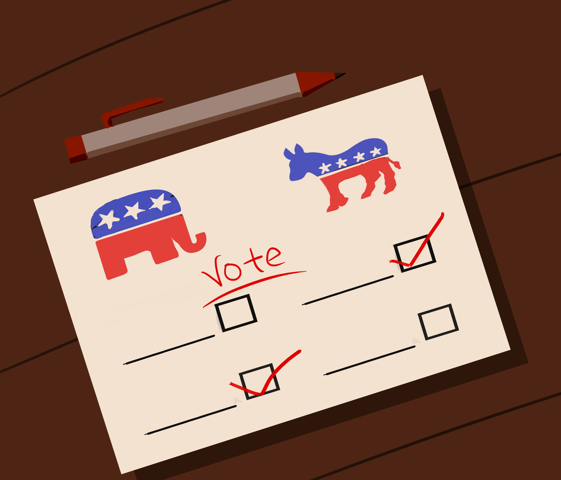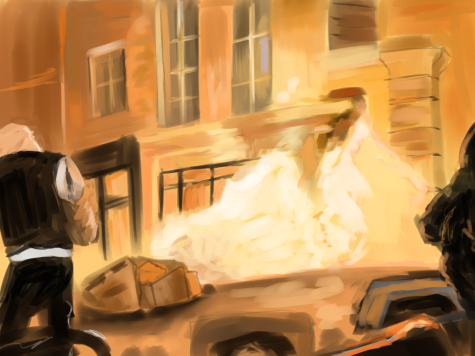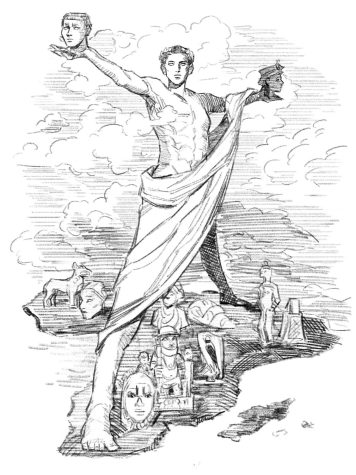All You Need to Know About Super Tuesday

Art credits to Nicole Zhu!
April 20, 2016
The media has grown increasingly obsessed with the 2016 presidential election. It is nearly impossible to turn on the news without hearing at least a little bit about the candidates or their campaigns. March is an especially important month in the election process, since the infamous “Super Tuesday” takes place during this time.
Many Ridge students, however, express uncertainty every day over the political process. “I don’t really know a whole lot about Super Tuesday,” explains Kourtney Dobkin ‘17. “I mean, I know it’s a really important day in the election process, but I don’t know a whole lot about the results of it, or why the media makes such a big deal about it.”
In general, many people have heard the term Super Tuesday at least once, but very few are fully aware as to what it means. Despite the lack of widespread knowledge, Super Tuesday holds immense significance for the campaigns of presidential candidates and remains a date that all citizens – teenager or adult – should observe carefully.
What does the term “Super Tuesday” even mean?
“Super Tuesday” is the unofficial name for the day when the greatest number of states hold their primary elections or caucuses, which eventually determine the nominee for president from each political party. Thirteen states hold their primary elections all on one day, making it a significant event in the presidential election process. The thirteen states are Alabama, Alaska, Arkansas, Colorado, Georgia, Massachusetts, Minnesota, Oklahoma, Tennessee, Texas, Vermont, Virginia, and Wyoming, as well as the United States territory of American Samoa.
Why does it exist?
Despite the hype surrounding it, Super Tuesday is in actuality not very old. In fact, the first Super Tuesday took place 28 years ago, in 1988. It was developed in order to test the presidential contenders and see if they could run a tight campaign and demonstrate the leadership qualities necessary to be the future President of the United States. The development of Super Tuesday helped ensure that the candidates had to work on a national level throughout their campaign rather than focus solely on one state at a time.
When is it?
This year, Super Tuesday took place on March 1. It only occurs once every four years, when presidential elections occur. Other election days during the primaries may be referred to as “mini Super Tuesdays” if multiple states are also voting on the same day. However, there is still only one official Super Tuesday.
What’s the big deal, anyway?
Many people consider Super Tuesday to be a crucial moment in any contenders’ campaign. This day holds particular significance for front-runners, as it shows if they truly have a chance to win the nomination. Strong Super Tuesday performances generally indicate strong performances in future primaries and caucuses, as well as the general election. Based on past trends, the candidates who win the most amount of delegates on Super Tuesday generally end up being the presidential nominee for their party. Since so many delegates are up for grabs, winning the most delegates solidifies each candidate’s spot as a possible choice for the presidency.
Who participated in Super Tuesday this year?
On the Republican side, five candidates participated: Donald Trump, Marco Rubio, Ted Cruz, John Kasich, and Ben Carson. On the Democratic side, only Hillary Clinton and Bernie Sanders participated in Super Tuesday. The other two competitors in the Democratic race dropped out of the race prior to Super Tuesday.
How does Super Tuesday work?
The exact process varies from state-to-state and depends on the political party the process is for. Some states, like New Jersey, hold primary elections. Voters line up at an election booth in order to vote for who they believe is the best candidate. Other states, like Colorado and Nevada, hold caucuses, which are large meetings of people who debate and decide on their nominee. In some states, the Republican party may be holding a caucus while the Democratic party holds a primary election, and vice versa.
So, what were the results?
Hillary Clinton and Donald Trump both solidified their place as the front-runners for their respective parties. Hillary won the most delegates in 7 out of 11 states, giving her a total of 513 delegates for the upcoming convention. Bernie Sanders, Clinton’s Democratic contender, won a total of 343 delegates. On the Republican side, Donald Trump won the most delegates in seven states. Cruz won over three states, and Rubio only received the highest marks in one state. John Kasich received delegates, but could not win over any particular state. After a pitiful performance during Super Tuesday, Republican candidate Ben Carson dropped out of the race soon after the results came in.
What happens if you win?
No one wins, really. The point of these primary elections is to win delegates, which will help a candidate continue into the general election. The candidates with the most delegates have the best chance of winning the nomination during their party’s national convention. When people vote for a specific candidate from their party on Super Tuesday, they give their candidate a specific amount of delegates from that particular state. The more delegates a candidate has, the more likely it is that they will win the nomination from their party.
Why does it matter to us?
Even though most of us cannot vote just yet, the turnout of the elections bears heavy importance for our futures. Whomever the people choose in the 2016 election will be President for at least the next four years – a period of time when many Ridge students will either start to live on their own or begin to involve themselves in politics.
“I personally think the election is really important,” Sophia Ravaioli ‘17 asserts. “This is our future at stake. His or her decisions have an even bigger impact on us, because we’re the upcoming generation.”
As students grow up and start to explore the world on their own, it is important to keep in mind the kind of world they want to live in. In order to live in the best possible version of the United States, it is incredibly important to vote and pay attention to major political decisions and their subsequent impacts on the future.


